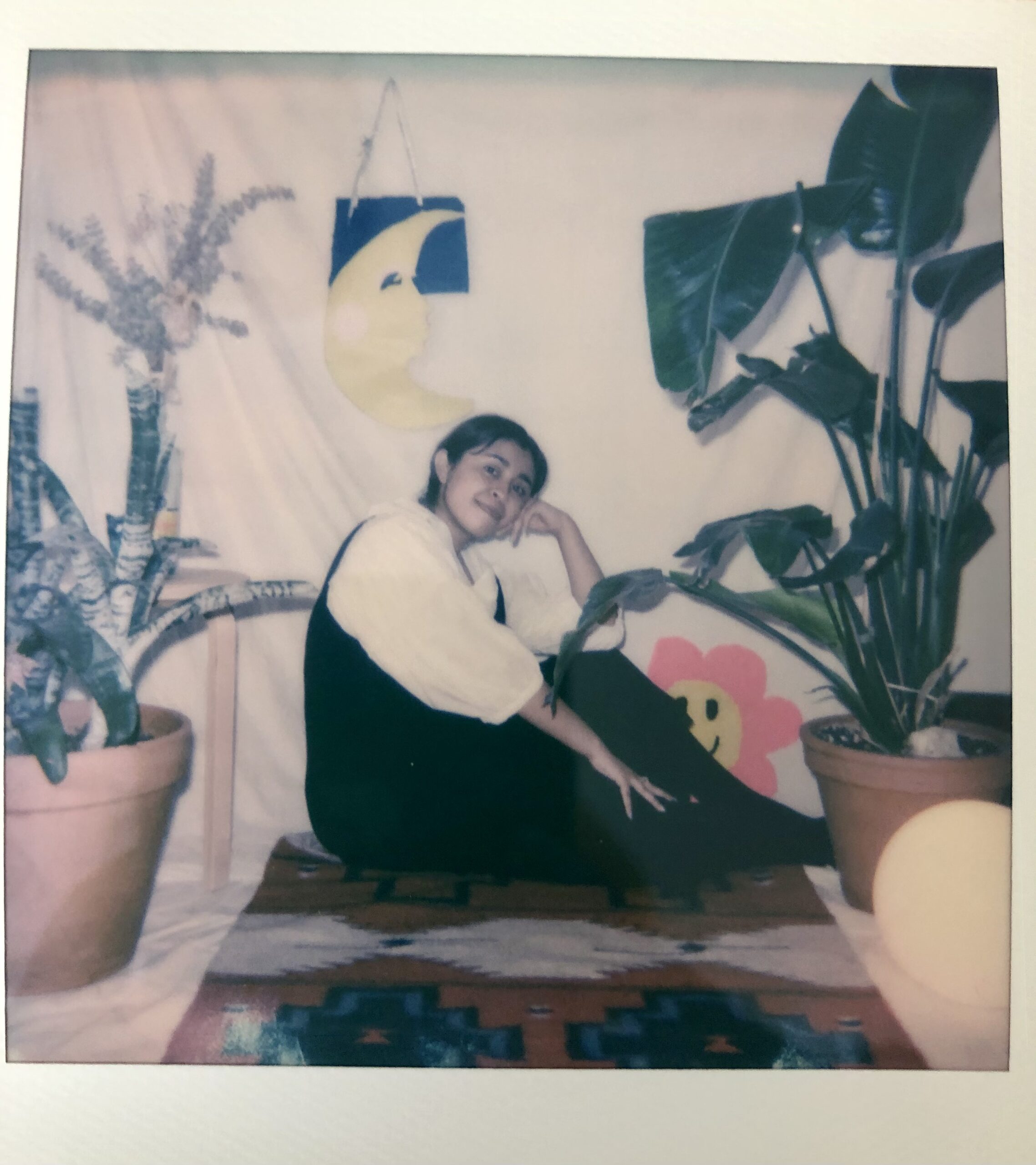

For Mia Joy, journeying into the insular, mystic world captured on her debut LP Spirit Tamer has been her life’s work. A meditation on the connection to self, creating and debunking personal myth, enduring changes post-heartache, and believing in the promise of discovering anew, Joy’s nearly three-year undertaking writing and recording the project is detailed across its 10 tracks. Swept up in dreamy guitar, Joy uses her instruments—including her haunting voice—to start a conversation; confronting those she’s met along the way. Not to mention, herself.
Now that the album’s out, she trusts she’s exactly where she should be. “I naturally got here, I think, because of my very niche, specific interests,” she says over the phone the week after Spirit Tamer’s May 7 release via Fire Talk Records. “Luckily for me, they kind of lined up. It all kind of fell into place as I became a user of all the colors I’m made up of and the tools at my disposal.”
“And,” she pauses, “I just got really lucky that people choose to listen to me.”
Joy, born Mia Joy Rocha, figured she’d be some type of creative when she grew up. An appreciation of music has always been strong in her family, particularly on her paternal side—starting with her grandmother, who had a love of Selena and bar bands, according to a recent Chicago Reader profile. Some of Joy’s earliest memories include singing for her as a child. Joy’s dad is a veteran blues guitarist in the city and her older brother also followed the musician’s path.
“I always sang – as soon as I could talk, I would sing,” she recalls. “My dad would make me sing with him. He always had a studio in the basement and I would sit on his lap and we would sing together. There was a lot of Boomer dad rock: Steely Dan, Jimi Hendrix, Santana. We’re also Chicanas, so he would sometimes show me other traditional Mexican songs his mother showed him.”
“My mom, a poet, loves Sadé and Enya and Bossa Nova,” Joy continues. “She introduced all the R&B ‘90s greats. I’m a melting pot of both of them,” she laughs, “but obviously I went in a lot of different directions as well.”
Though she sang in her church choir with her Sunday School class and spent three years as part of the Chicago Children’s Choir starting in fourth grade, Joy didn’t pursue a formal musical education—instead opting for painting and pottery while advancing her knowledge of indie sub-genres and avant-garde artists at the library or alone in her room. Bands like Cocteau Twins, Grouper, and Deerhunter, and pioneers Brian Eno and Björk served as entry points to another realm of musical possibilities.
“As a millennial, there was a lot of really legendary indie music coming out of that era,” she adds, remembering aloud. “2009 to 2012 was such an epic time for our generation, and I think that was also the precipice of me not being just a super fan or super music nerd and instead picking up the tools I had around me to replicate the music I was listening to in my own style.”
As she got older, her interest in storytelling also grew. Inspired in middle school by her English teacher, whom she remembers as “nurturing” and incredibly supportive of her writing, Joy found other parts of herself among the pages of Greek mythologies and the heroes and heroines connected to the cosmic.
An open interest in astrology has become trendier while garnering more mainstream acceptance, but when Joy was first introduced to the study she kept it under wraps; fearing it would further ostracize her “nerdy, little middle school” self from her peers. Practicing in secret until fairly recently (unless you happen to be part of her inner circle), she uses it to explore the spectrum of human experience and connect with others beyond superficial interests. Though she dabbled in music criticism and considered a career path on the editorial side of the industry, songwriting called her back.
The earliest iteration of Mia Joy as a musical expression can be found on her Soundcloud page, started in 2013, where songs “Soliloquy” and “L*U*C*I*D” serve as archives of the artist’s lo-fi roots and other skeletal recordings foreshadow tracks like Spirit Tamer’s stunning “Saturn.” The connections between music, astrology, and storytelling inform her to this day.
“Music is foremost a coping mechanism and a way I kind of regulate how I live and how I feel, and that is the way in which I approach music,” Joy details. “Astrology is in the foreground in the ways I try to understand the world as well and connect with others and myself. It’s naturally made its presence known, especially in the way I write stories and songs.”
“Saturn” is particularly treasured. Apart from being one of Joy’s earliest songs, the first she intentionally wrote along with a melody, it’s taken on new significance in light of her own birth chart.
“The funny thing is I wrote it when I was 20 or 21 years old,” Joy admits. “It’s written in the voice of Saturn, asking you all the ways it’s helped you or hurt you and how you’ve grown through disappointment and abandonment and sorrow. All of those restricting kind-of life lessons. Then it does this callback to me answering and my specific relationship to Saturn. Now it takes on a different meaning because I’m actually going through my Saturn Return, and my album came out during my Saturn Return.”
Simply put, Saturn Return is when the planet returns to the same place it occupied in the sky at the moment of a person’s birth. For astrologers, it’s an important occurrence that ushers in a period of intense change; leading us out of the last remnants of childhood and into lessons of maturity, responsibility, and discipline (characteristics of Saturn). Basically, it could explain why the end of your twenties can be incredibly turbulent and ultimately, life-changing—and why everyone’s relieved when they enter their thirties.
“It feels like the album is reaping the benefits of all the sorrow and disappointment, and it’s proof I’ve learned how to be self-reliant and resilient and own those things in my life,” she says. “It’s very symbolic, and I always cared so much about that song and wanted to do it justice by having a more elaborate, higher production-value version of it. I was waiting for the opportunity to make an album to throw it on there. It’s one of my favorite songs. It reflects my music taste and the direction I want to go in.”
Such intimate consideration is part of Joy’s practice. It’s part of why Spirit Tamer was such a labor of love. As she peeled back the layers, exploring the intersections of her life and extensions of her experiences became central to finishing the album as she envisioned.
“It’s been such a private relationship for 10-plus years,” she adds. “It’s really bizarre to be talking to you about it now, publicly. My parents are pretty religious so I had to hide it from them for years. I’m still hiding it from them, so I’m kind of horrified,” Joy laughs nervously, “but I don’t know why I’m almost 30 years old and still hiding things from my mom. Spirituality is prevalent in our family for sure, and I really appreciate that open-mindedness, but I think I just went really far to the left with the witchy stuff.”

Despite often describing herself as a private person who is usually shy and quiet, committing her truths to tape has become comfortable for the artist. The idea of touring and playing live shows again, however, brings on as many nerves as it does tepid excitement.
Gigging around Chicago helped Mia Joy build a cult-like following among garage and psych rock fans after the release of her 2017, reverb-drenched EP Gemini Moon, but her interest in more ambient, abstract sounds could be heard bubbling beneath the surface. Replacing the electrified anxieties behind Gemini Moon is Spirit Tamer’s soothing, but no less stirring, state.
Rather than starting things off with a bang, her unassuming stage presence commands its audience as tension builds across her live set. It’s unintentional, but fans have come to recognize when Mia Joy and company have found their groove. Knowing she’s not going to be the loudest in the room, playing shows hasn’t necessarily come with the same certain ease as creating behind the scenes.
“It feels like this Shakespearean tragedy,” she laughs, poking fun at her stage fright. “The thing I want to do most in life is sing songs and then I have to do it in front of a lot of people.”
She’s felt at home in the coziness of venues such as Hideout, whereas others have found her in a battle of wits with the crowd. Bantering turns to light heckling to remind patrons talking over the set that someone’s on stage trying to entertain them. Navigating the space between the urge to engage and just lose herself in her own performance has come with time over the past six years of appearing around the city.
“At different venues, sometimes you can just play a show and know people will talk over you or be annoying. Sometimes I can just have a whatever attitude and be silly with Joey [Farago, keyboardist] and make banter. Those are the good shows, where I’m just kind of in a ‘fuck it’ attitude and have fun with it. Then there are shows where I’m feeling really sensitive and I want to do my best,” Joy says.
“I do like performing once in a while,” she clarifies. “Once you get into a good flow and you and your bandmates are connecting, it is a wonderful thing. Empty Bottle is where grown men at the bar are yelling and talking, and me and Joey are heckling them on stage as we’re performing. It’s hard to hear, so I just have to be like ‘You in the yellow shirt, what are you talking about?’ I try to do it in a silly way, but yeah, I don’t like people talking over me, of course.”
A showcase of Joy’s musical curiosities in its intricate compositions and audiophiliac production, her work requires your attention to fulfill its immersive purpose. Her voice softly floats just above a gauze of layered strings and synths, exercising restraint without sacrificing its raw power. A husky whisper, with a bit of grit to boot when necessary, she lulls you into tales of forgiveness, forgotten birthdays and exes who loved Korn’s “Freak on a Leash.”
“It was really important to me that I wasn’t pigeonholed or sticking to one sound because it wouldn’t have been authentic to the direction I wanted to go in,” she says. “I listen to and care about so many textures and sounds, it made sense for it to be kind of… across the board.”
Joy reunited with friend and longtime collaborator, Pallet Sound’s Michael Mac for production on Spirit Tamer. The two have known each other since 2014, when she moved into a coach house in Chicago’s Bridgeport neighborhood. Mac occupied the basement, then playing guitar with art rockers Oshwa and recording other local artists in his spare time. He’s since had a bird’s eye view of Joy’s evolution as an artist and confidant.
“My song ‘10,000 Things’ was my first demo ever that wasn’t in my bedroom – it was with Michael because we lived together. We’ve been collaborating and working together pretty much my entirety of making music,” she says.
“I feel really grateful, but I also feel so spoiled because I know at some point I’m going to have to work with someone else,” Joy half-jokes. “Michael’s a great person to work with in general, and as far as working with men who are audio engineers, he wants to make the vision that lives in your head. He’s not overstepping his bounds and doesn’t have an agenda other than patiently working with you and listening.”
Some of the songs on Spirit Tamer were ripped straight from her loop pedal, which she’s had for years. Recorded alone in her bedroom, she says she was “insistent” Mac keep some of those takes; the almost inaudible guitar plucking, dissolving in a haze of Joy’s gentle vocal play – it’s ethereal.
“That energy is really hard to recreate. You can create a perfect take in the studio, but to me, it’s not the same as having the energy in my bedroom,” she explains. “I think a lot of lo-fi artists can relate to that and it’s easier for me to be secluded and private and take vulnerable vocal takes – especially with tracks ‘Sword (I Carry)’ and the harmonies in ‘Saturn.’ They’re visceral. They pay homage to my roots.”
Most of the folks who lent a hand to the making of the album have been around since the beginning. She tapped friends Farago and Moontype drummer Emerson Hunton to contribute keys and percussion. It takes a village to bring a dream to life and, with the release of her very first full-length album, Joy feels the weight of the love of her own.
“That’s part of what makes this project so special,” she gushes. “Almost every single person that I’ve worked with is a close friend of mine. It shows the trust put into how these songs were made. The people who were involved with this record are also emotionally involved. They wanted to make it happen and wanted it to be out there because they care about me.”
The support from Chicago’s music community and in studio also helped Joy stand firm in her convictions when it came to how she wanted Spirit Tamer to be packaged and how she wanted to be represented as an artist to a wider, general public. In the summer of 2020, she signed with Brookyln-based label, Fire Talk Records. Joy is the fifth Chicago artist to sign to the label, alongside fellow powerhouse acts Dehd, Deeper, Fran, and Accessory (a project of Dehd’s Jason Balla).
After speaking with Fire Talk’s founder Trevor Peterson, she felt her autonomy was respected and that Peterson shared her mission of fostering a supportive, inclusive environment for artists.
Further proof of the groundedness she establish through the solitary reflection behind bringing Spirit Tamer to life, Joy – who opened up to Audiofemme about living with depression, experiencing tough times throughout her childhood, and the trauma of losing one of her best friends – isn’t afraid to advocate for herself in business talks.
“The album was ready and I was feeling very worried that nothing was ever gonna come from it,” she says. “I had sent it to other labels and I’m so grateful things never happened with them just because of general ethics. I didn’t want to feel tokenized as a person of color, being the only person of color on an all-white roster, ran by all white people. That was a conversation I had with Trevor. That’s something I will continue to care about, making the music industry a more intersectional place. It’s essential for me to feel comfortable in the creative community in continuing to be a musician.”
“I’ve never been on a label of this size before,” Joy continues. “I’m new to this industry. [Signing] was very exciting and I was very honored and am very grateful. From the very beginning, as a female, I was very firm in my boundaries and my vision – especially as a woman of color. With a little status behind me in the beginning, I made sure I expressed how I wanted to conduct this and what the sound was all about. Had they not been receptive to it, I would’ve just kept moving on. It’s really comforting to know we’ve established a rapport and trust. I feel very taken care of by my label and think they go really hard for me. I love that.”
The conversations extended to her public relations team, who would promote singles like “Haha” and “Freak” and “Ye Old Man,” to make sure her music wasn’t reduced to “break-up pop songs” or her continually evolving familial relationships. “The imagery and symbolism of Spirit Tamer and being the master of your own feelings and your own direction, collecting all of your lows and your highs and creating resiliency – it’s supposed to be for soothing and for solace and to contemplate yourself,” Joy muses. “Heartbreak is very strong and very universal and there are songs on there about it, but it’s also like, my dad makes me sad sometimes. There’s a song about my friend passing away that was hugely traumatic and a big part of my life.
“The song ‘Ye Old Man’ is about my dad, actually,” she reveals. “I think it’s important that people don’t think that’s just a cheesy break-up song. Me and my dad had to talk about it because he’s really proud of me and he shares my music with his buddies. I told him, you know, ‘I don’t want you to think I hate you and this is me burning you or anything.’”
Taking a breath, Joy chooses her words delicately, “It was coming from a place of realizing sometimes parents make mistakes and I had to accept him for his flaws. Sometimes they’re not just a parent and sometimes I’m not just a child. We’re learning the dynamics of how to understand and relate to each other as we get older. I think I’m still a puzzle to them. Hopefully I will make more sense to them now that I’m starting to share more of myself with the world. I know they’re proud of me.”
Remaining aware and vulnerable to the process of understanding and accepting the realities of who and what surrounds you will follow Mia Joy as her ascent persists. It’s the never-ending work she agreed to long ago and if Spirit Tamer is any evidence, her pursuits are paying off. Though live music is making its return, she doesn’t have anything booked for 2021 yet. She hopes to do some performances throughout the year and tour in 2022, but hasn’t stopped writing new material.
Don’t be surprised if her re-emergence feels like playing catch-up.
“Musicians can relate, especially if it’s a really long-term project like this was for me,” she says. “In a way it’s a cathartic relief. It’s both scary and exciting now that it’s time to think about something else. I’m in a vastly different place, listening to different things, being influenced by different things. I’m going further down the ambient rabbit hole; getting even more avant-garde and wacky and experimental.”
Grace in her tone, Joy humbly accepts her current place in the spotlight.
“I can’t say how grateful I am enough. It’s such a crazy privilege to even be able to release anything right now with the state of the music industry and society and everything at large. It’s not lost on me,” she expresses. “This feels like such a shooting star in a really dark time. I’m just a nerdy, anxious little guy over here. It feels really surreal.”
Follow Mia Joy on Instagram for ongoing updates.




